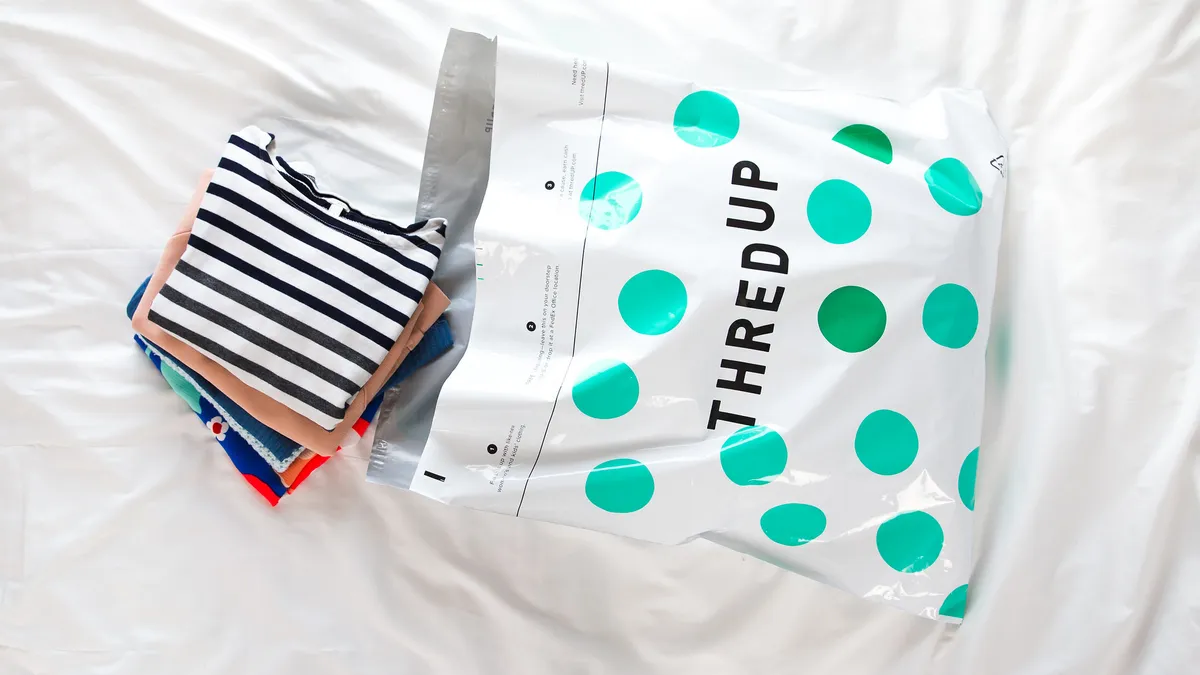Dive Brief:
- As consumer budgets continue to be strained, the U.S. used clothing market reached $43 billion in 2023, up from about $23 billion in 2018, according to ThredUp’s most recent resale report. Year over year, the U.S. secondhand market grew 11% in 2023, which was seven times faster than the broader U.S. clothing market.
- Of the $43 billion U.S. market in 2023, resale gross merchandise value specifically amounted to $20 billion, up from $17 billion last year. ThredUp estimates that the U.S. secondhand market will reach $73 billion by 2028, increasing an average of 11% annually.
- Globally, ThredUp predicts that the secondhand apparel market will reach $350 billion by 2028, up from $197 billion in 2023 and $141 billion in 2021. The global used apparel market grew three times the rate of the overall apparel retail market in 2023, per the report.
Dive Insight:
ThredUp’s annual resale report once again includes lowered projections for growth.
Last year, the company said the worldwide secondhand goods market would reach $350 billion by 2027. In its new report, the resale company lowered its prediction to $324 billion by 2027. The U.S. secondhand market is more on track with last year’s projections: ThredUp in 2023 said the market would grow to $70 billion by 2027, and the latest report estimates that it will reach $69 billion by that year. But that number is down significantly from ThredUp’s 2022 prediction that the U.S. secondhand market would reach $82 billion by 2026.
Still, the new projections represent continued double-digit growth in the secondhand market, both in the U.S. and globally, over the next few years.
“As we celebrate this progress, we also recognize the powerful role the government can play in accelerating the transition to a more sustainable future for fashion,” James Reinhart, ThredUp CEO, said in the report. “Now in its 12th year, the Resale Report shows some of the most promising signals of what that future could look like with increased levels of support. Until fashion is no longer one of the most damaging sectors of the global economy, we will continue to advocate for the government to help drive adoption and behavior change in fashion.”
ThredUp’s report offers some insight into why consumers are buying more secondhand goods, including financial motivations. More than half (55%) of consumers surveyed said they will spend more of their budget on used clothing in 2024 if the economy doesn’t improve. The top reason for shopping secondhand, which was true for six in 10 consumers ThredUp surveyed, is to get a better deal.
The findings build upon previous years of research, where ThredUp has found consumers turning to secondhand clothing to handle the impacts of inflation. The resale company’s 2022 survey found that 44% of shoppers were cutting back on clothing spending in the face of higher prices. More than half (58%) of consumers at the time also said buying secondhand helped them amid inflation.
Another reason emerging from previous resale reports is the declining stigma associated with used clothing. A 2023 survey from OfferUp and GlobalData found that 76% of respondents said the stigma behind used clothing is declining. More than half of respondents said the change is attributed, in part, to the desire for more affordable items (57%) and the changing perspective on waste (55%).
Though the secondhand market is growing fast as it gains in popularity, questions around the profitability of resale operations have arisen over the years. Some experts suggest secondhand sales are most effective in physical stores versus online. Still, shoppers are buying secondhand items online: ThredUp’s report suggests 63% of used apparel shoppers last year made a purchase online. As to which brands are most effective in resale, based on ThredUp’s gauge of sell-through and volume sold in 2023, the top three were all athletics or outdoorsy brands: Lululemon, Patagonia and Vuori, respectively.















